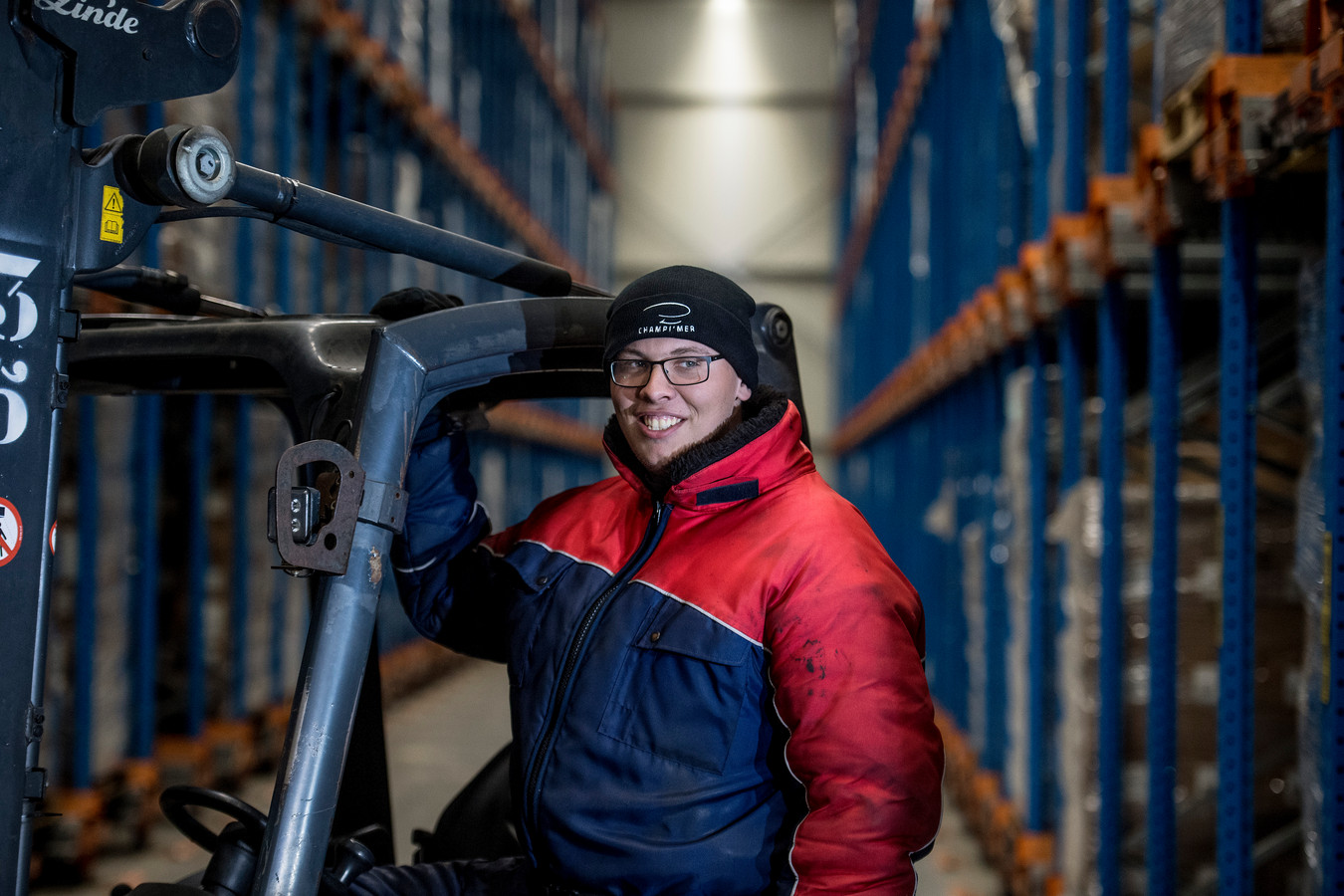Work in the Netherlands with Quality Uitzendbureau
Warehouse & Production Jobs | Good Housing | Apply with Friends
Are you looking for stable work, good conditions, and a chance to build a future in the Netherlands? At Quality Uitzendbureau, we are always looking for motivated individuals to join our team in warehouse and production roles across various locations in the Netherlands.
About Us
Founded in 2006, Quality Uitzendbureau is a reliable and innovative employment agency with over 15 years of experience. We specialise in placing production workers in the food industry, and we are known for being dynamic, flexible, expert, and committed—according to our clients.
Our close-knit team truly understands the unique needs of production employees and is always ready to offer tailored, effective support—both before and during your employment.
What We Offer
-
Full-time positions in warehouse and production environments
-
Clean, comfortable housing arranged by us
-
Transport to and from work by car or bicycle
-
Weekly payment and clear communication
-
Opportunities to work with friends or partners
-
Jobs in multiple cities across the Netherlands
Who We’re Looking For
-
Motivated individuals ready to work in logistics or production
-
Willingness to work in a fast-paced environment
-
Basic English or willingness to learn
-
EU nationality or valid working documents
Apply Now
After submitting your application, one of our recruiters will contact you by phone to discuss the next steps and help you get started.
Apply
Order Picker – Chicken Factory
Job Opening: Order Picker – Chicken Factory
Location: Bodegraven
Hourly Rate: €14.06
Type: Full-time
Are you accurate, driven, and looking for a hands-on role in logistics?
Then the position of Order Picker in one of our partner chicken factories might be perfect for you!
What will you do?
-
Process all incoming and outgoing goods
-
Ensure the logistics process runs efficiently and smoothly
-
Prepare orders for transport
-
Label and sticker products accurately
What we offer:
-
A competitive salary of €14.06 per hour
-
Opportunities to learn and grow within the company
-
A stable position close to home in the Bodegraven area
What we are looking for:
-
Previous experience as an order picker
-
Availability to work full-time
-
Required certificates (or willingness to obtain them)
-
Ability to work in a cold environment (2° to 10° Celsius)
-
Residence in or around Bodegraven
-
Ability to commute independently (own transport required)
Apply Now
Are you enthusiastic about this opportunity? We would love to receive your application via our online form.

Inbound Controller (Logistics Employee)
About Quality Uitzendbureau
Founded in 2006, Quality Uitzendbureau is a reliable and innovative employment agency with over 15 years of experience. We specialise in deploying production workers in the food industry and are known for being dynamic, flexible, expert, and committed, according to our clients.
Our close-knit team understands the unique needs of production employees and is always ready to provide tailored, effective solutions to every staffing challenge.
Position: Inbound Controller
We are looking for a dedicated and experienced logistics employee for the role of Inbound Controller. This is an excellent opportunity for someone who enjoys working in a fast-paced warehouse environment and has a keen eye for detail.
Responsibilities:
-
Checking and receiving incoming goods
-
Accurately entering goods into the Warehouse Management System (WMS)
-
Supporting general all-round warehouse activities
-
Collaborating with the logistics team to ensure smooth warehouse operations
Requirements:
-
Experience in logistics, with a focus on inventory control
-
Good computer skills, especially with WMS systems
-
Accurate and structured way of working
-
Strong command of the English language, both spoken and written (C1 level)
-
Comfortable working with meat and pork products
-
Immediately available
What We Offer:
-
Transportation to and from work (by car or bicycle)
-
Weekly payment and full support from our experienced team
-
A long-term position within a stable and growing company
-
A motivated and respectful working environment

Join Velder as a Factory Worker or Order Picker!
At Velder, we’re looking for reliable and motivated factory workers and order pickers to join our team in Bodegraven. Whether you're helping with cheese processing, packing, or preparing orders, your role is essential in bringing top-quality cheese to customers across the Netherlands and beyond.
We are the #1 supplier of a complete assortment of Dutch and international cheeses and related products. Our work environment is professional but friendly, and we offer real opportunities to grow.
Why Work at Velder?
-
Hourly Pay: €14,73–€20,62, depending on your shift
-
Travel reimbursement up to €0.23/km
-
Work gear provided (jacket, badge, safety shoes)
-
Weekly pay
-
Introductory training provided – no experience needed!
-
Warm, team-oriented atmosphere
Your Role May Include
-
Picking orders using handheld scanners
-
Sorting, packing, and labeling cheese products
-
Loading/unloading goods
-
Working in a chilled warehouse (3–5°C)
-
Following hygiene and safety rules
Job Requirements
-
Basic understanding of English or Dutch
-
Willing to work in a cold environment (3–5°C)
-
Physically fit – able to lift, stand, and move for long periods
-
Flexible with shift work – mornings, evenings, and Saturdays
Bring a friend, partner, or sibling – we welcome everyone!
At Velder, we’re offering great job opportunities for factory workers and order pickers – and yes, you can work together with your partner or friends! Whether you're helping with cheese processing, packing, or picking orders, you’ll be part of a warm and welcoming team.

Job Opportunity in the Netherlands with Stuwarooij B.V. - No English Required!
Are you looking for a rewarding job opportunity in the Netherlands? We have the perfect position for you!
Company: Stuwarooij B.V. (Logistics & Cargo Delivery)Location: Various locations in the Netherlands (main city: Rossum)
Duration: Minimum 6 months
Language Requirement: No English needed – interviews conducted in your native language
Experience: Not required
Why Work in the Netherlands?
The Netherlands is renowned for its high quality of life, excellent work-life balance, and vibrant cultural scene. Working here offers numerous benefits, including competitive salaries, extensive social benefits, and the opportunity to experience a new culture and way of life. It's a great place to start and build your career, especially in the logistics sector.
Job Description
You’ll be unloading shipping containers by hand in pairs. Contents vary – anything from teddy bears to electronics and wine.
Note: It's a physically demanding job – packages can be up to 25kg. Flexibility in location and schedule is required.
Work in teams of 2, average 4 containers per day
Shifts: Monday to Saturday (mornings only, variable ending time)
Some days you may change work location (transport provided)
You’re paid even if the work finishes early
Salary & Growth
Starting: €2,100 gross (approx. €14.58/hour)
After 3 months: €2,150
After 6 months: €2,225
Holiday bonus: 8% of gross salary (paid in June or when you leave)
Saturdays: +50% pay
Sundays & public holidays: +100% pay
Guaranteed 36 hours/week
Benefits
Accommodation: (2-person rooms)
Transportation: Free transport to work; drivers may be asked to drive – all expenses covered
Advance Pay: €75/week after the first week of work
Health Insurance
Accident insurance with repatriation included (free)
Additional Perks
Possibility for permanent contract after 2 years
Stable job with fixed contract hours (not a temp agency)

Warehouse Worker - Sligro Vianen 2025, Apr 13
Position Title: Warehouse Worker (Normal, 0/+5°C Environments)
Department: Logistics
Available Roles:
- Expedition/Packaging Worker: Sort and scan products in the final stage of the logistics process before dispatch. Requires physical strength for work in temperatures of 0/+5°C.
- Order Picker & EPT Driver: Picks and organizes food products with a hand scanner, transferring items to the outbound area (0/+5°C) and driving an Electric Pallet Truck (EPT) with up to five containers.
- Container Builder: Assembles and organizes roll containers for distribution in the warehouse (normal temperature).
- Emballage Worker: Sorts used crates, pallets, and roll containers, loading packaging materials onto trucks.
- Reach Truck Driver: Operates a reach truck to move pallets around the warehouse and deposit them in areas with temperatures of 0/+5°C.
Company Overview
Sligro operates a network of self-service wholesalers and delivery centers across the Netherlands, serving diverse customer segments such as catering, hospitality, retail, and institutional markets. Sligro has an exclusive distribution partnership with Heineken for cask beers within the Netherlands.
Website: Sligro Website
Working Conditions
Location: Vianen
Shift Schedules:
- Expedition Worker: Sunday - Thursday, 10:00 PM - 7:00 AM
- Order Picker: Monday - Friday, 10:00 AM - 6:45 PM
- Container Builder: Monday - Friday, 8:00 AM - 5:00 PM
Hourly Pay:
- Order Picker & EPT Driver: €14.81 gross/hour
- Reach Truck Driver: €14.37 gross/hour
Overtime and Temperature Premiums:
- Shift Premiums:
- 6:00 PM - 10:00 PM: +25%
- 10:00 PM - 5:00 AM: +50%
- Temperature Premiums:
- Fresh Area (+5/+10°C): +€0.49/hour
- Freezer (-18/-28°C): +€1.19/hour, with a 15-minute break every hour in freezer conditions
Transportation:
- Free transportation to work.
Qualifications:
- EPT certification is preferred.
- Reach Truck certification is mandatory (if applicable).
Experience:
- Essential experience in order picking and EPT operation.
- Reach Truck experience (at least six months) is required.
- Strong numerical skills for order accuracy.
Language Skills: English at B1 level or higher.
This role at Sligro Vianen is ideal for those with a background in warehouse operations, particularly those comfortable in temperature-controlled environments and physically demanding work. The position provides solid pay, shift premiums, and a supportive work environment focused on efficiency and teamwork.

Summer Jobs in the Netherlands – 2025 Season
Work. Earn. Explore!
Are you looking for an exciting summer job abroad? Join us in the Netherlands for the 2025 season and experience a fantastic opportunity to work, earn, and meet new people!
🔹 Job Roles Available:
We offer various positions in:
✅ Logistics 📦
✅ Production 🏭
✅ Agriculture 🌱
🔹 What We Offer:
✔ Guaranteed Accommodation 🏠 (fully arranged)
✔ Free Transport 🚐 to work and back
✔ Attractive salary 💰 (weekly or monthly payments)
✔ Contracts for 2-3 months – ideal for students 🎓
✔ Work with friends or as a couple 💑👫
🔹 Job Locations:
🌍 Various cities: Amsterdam, Eindhoven, Venlo, Veghel, Nijmegen, and more!
🔹 Requirements:
✅ English language skills (B1 level or higher)
✅ Availability for 2-3 months (May - September 2025)
✅ Motivation & willingness to work
💡 Perfect summer job for students, travelers, and adventure seekers!
📩 APPLY NOW and secure your spot for summer 2025!
For more details or to submit your application, contact us today!
🌍 Work. Travel. Experience. 🌍

No comments
Leave a reply
Summer Jobs in the Netherlands – 2025 Season
Work. Earn. Explore!
Are you looking for an exciting summer job abroad? Join us in the Netherlands for the 2025 season and experience a fantastic opportunity to work, earn, and meet new people!
🔹 Job Roles Available:
We offer various positions in:
✅ Logistics 📦
✅ Production 🏭
✅ Agriculture 🌱
🔹 What We Offer:
✔ Guaranteed Accommodation 🏠 (fully arranged)
✔ Free Transport 🚐 to work and back
✔ Attractive salary 💰 (weekly or monthly payments)
✔ Contracts for 2-3 months – ideal for students 🎓
✔ Work with friends or as a couple 💑👫
🔹 Job Locations:
🌍 Various cities: Amsterdam, Eindhoven, Venlo, Veghel, Nijmegen, and more!
🔹 Requirements:
✅ English language skills (B1 level or higher)
✅ Availability for 2-3 months (May - September 2025)
✅ Motivation & willingness to work
💡 Perfect summer job for students, travelers, and adventure seekers!
📩 APPLY NOW and secure your spot for summer 2025!
For more details or to submit your application, contact us today!
🌍 Work. Travel. Experience. 🌍
Warehouse Worker - Sligro Vianen 2025
Position Title: Warehouse Worker (Normal, 0/+5°C Environments)
Department: Logistics
Available Roles:
- Expedition/Packaging Worker: Sort and scan products in the final stage of the logistics process before dispatch. Requires physical strength for work in temperatures of 0/+5°C.
- Order Picker & EPT Driver: Picks and organizes food products with a hand scanner, transferring items to the outbound area (0/+5°C) and driving an Electric Pallet Truck (EPT) with up to five containers.
- Container Builder: Assembles and organizes roll containers for distribution in the warehouse (normal temperature).
- Emballage Worker: Sorts used crates, pallets, and roll containers, loading packaging materials onto trucks.
- Reach Truck Driver: Operates a reach truck to move pallets around the warehouse and deposit them in areas with temperatures of 0/+5°C.
Company Overview
Sligro operates a network of self-service wholesalers and delivery centers across the Netherlands, serving diverse customer segments such as catering, hospitality, retail, and institutional markets. Sligro has an exclusive distribution partnership with Heineken for cask beers within the Netherlands.
Website: Sligro Website
Working Conditions
Location: Vianen
Shift Schedules:
- Expedition Worker: Sunday - Thursday, 10:00 PM - 7:00 AM
- Order Picker: Monday - Friday, 10:00 AM - 6:45 PM
- Container Builder: Monday - Friday, 8:00 AM - 5:00 PM
Hourly Pay:
- Order Picker & EPT Driver: €14.81 gross/hour
- Reach Truck Driver: €14.37 gross/hour
Overtime and Temperature Premiums:
- Shift Premiums:
- 6:00 PM - 10:00 PM: +25%
- 10:00 PM - 5:00 AM: +50%
- Temperature Premiums:
- Fresh Area (+5/+10°C): +€0.49/hour
- Freezer (-18/-28°C): +€1.19/hour, with a 15-minute break every hour in freezer conditions
Transportation:
- Free transportation to work.
Qualifications:
- EPT certification is preferred.
- Reach Truck certification is mandatory (if applicable).
Experience:
- Essential experience in order picking and EPT operation.
- Reach Truck experience (at least six months) is required.
- Strong numerical skills for order accuracy.
Language Skills: English at B1 level or higher.
This role at Sligro Vianen is ideal for those with a background in warehouse operations, particularly those comfortable in temperature-controlled environments and physically demanding work. The position provides solid pay, shift premiums, and a supportive work environment focused on efficiency and teamwork.

Logistics Employee - Capi Europe B.V. | Tilburg
Are you a logistics talent with a hands-on mentality? Do you thrive in a dynamic environment and enjoy being part of a close-knit team? Join Capi Europe B.V. and help us grow a greener life!
Who Are We?
For 25 years, Capi Europe B.V. has been designing exceptional indoor and outdoor flower pots, supplying over 70 countries worldwide. Our Dutch factory in Tilburg operates 100% CO2 neutral, reflecting our commitment to sustainability. As an innovative and growing company, we’re welcoming new production robots, colleagues—and now, you!
Your Role
As a Logistics Employee, you will play a vital role in ensuring our products reach our customers efficiently and in perfect condition. Your tasks will include:
- Picking orders using EPT and preparing them for shipment.
- Packing and organizing shipments (parcels, pallets, containers).
- Sealing pallets for secure delivery.
- Unloading and loading goods.
- Preparing exhibition and event materials.
- Keeping the warehouse organized and tidy.
Your Profile
We’re looking for someone who:
- Has a hands-on mentality.
- Speaks Dutch or English.
- Is a team player who thrives in a family business culture.
- Lives in or near the Tilburg region.
- Bonus: A reach truck certificate is a plus!
What We Offer
At Capi Europe, you’ll enjoy:
- Growth opportunities in job content and responsibility.
- Employee discounts on our sustainable products (your home will soon be filled with pots and plants!).
- A competitive salary of €14.68 gross per hour.
- Pension plan with no employee contribution.
- 25 days of annual leave.
- Access to our fitness room and weekly running training.
- Fresh fruit and homemade soup every week.
- Regular company events like monthly drinks, themed activities, and showroom sessions to keep you engaged and informed.
- A welcoming atmosphere with over 75 enthusiastic colleagues.
Work Schedule
- Day shift: Monday to Friday, 08:00 - 17:00.
Apply Now!
Are you ready to join a sustainable, innovative, and fun workplace? Start your journey with Capi Europe today.

Logistics Employee - Capi Europe B.V. | Tilburg
Are you a logistics talent with a hands-on mentality? Do you thrive in a dynamic environment and enjoy being part of a close-knit team? Join Capi Europe B.V. and help us grow a greener life!
Who Are We?
For 25 years, Capi Europe B.V. has been designing exceptional indoor and outdoor flower pots, supplying over 70 countries worldwide. Our Dutch factory in Tilburg operates 100% CO2 neutral, reflecting our commitment to sustainability. As an innovative and growing company, we’re welcoming new production robots, colleagues—and now, you!
Your Role
As a Logistics Employee, you will play a vital role in ensuring our products reach our customers efficiently and in perfect condition. Your tasks will include:
- Picking orders using EPT and preparing them for shipment.
- Packing and organizing shipments (parcels, pallets, containers).
- Sealing pallets for secure delivery.
- Unloading and loading goods.
- Preparing exhibition and event materials.
- Keeping the warehouse organized and tidy.
Your Profile
We’re looking for someone who:
- Has a hands-on mentality.
- Speaks Dutch or English.
- Is a team player who thrives in a family business culture.
- Lives in or near the Tilburg region.
- Bonus: A reach truck certificate is a plus!
What We Offer
At Capi Europe, you’ll enjoy:
- Growth opportunities in job content and responsibility.
- Employee discounts on our sustainable products (your home will soon be filled with pots and plants!).
- A competitive salary of €14.68 gross per hour.
- Pension plan with no employee contribution.
- 25 days of annual leave.
- Access to our fitness room and weekly running training.
- Fresh fruit and homemade soup every week.
- Regular company events like monthly drinks, themed activities, and showroom sessions to keep you engaged and informed.
- A welcoming atmosphere with over 75 enthusiastic colleagues.
Work Schedule
- Day shift: Monday to Friday, 08:00 - 17:00.
Apply Now!
Are you ready to join a sustainable, innovative, and fun workplace? Start your journey with Capi Europe today.

Job Advertisement: Waiter/Waitress (The Netherlands)
Are you passionate about hospitality and delivering exceptional customer service? Are you looking for an exciting opportunity in the heart of Amsterdam? Join our team as a Waiter/Waitress and enjoy not only a fantastic work environment but also the benefit of accommodation provided!
What We Offer:
- Competitive salary with additional tips.
- Flexible working hours to suit your schedule.
- Accommodation provided in Amsterdam.
- Opportunities for growth and development within the company.
- A supportive and fun working atmosphere.
- Staff meals and discounts.
Your Responsibilities:
- Greeting and welcoming guests to ensure they feel at home.
- Taking orders accurately and providing menu recommendations.
- Serving food and drinks with efficiency and a smile.
- Maintaining a clean and organized dining area.
- Coordinating effectively with the kitchen and team members.
- Delivering exceptional customer service to create memorable experiences.
What We’re Looking For:
- Previous hospitality experience is a plus, but not required – we’re happy to train you!
- A friendly, positive attitude and a passion for great service.
- Ability to handle busy shifts with energy and composure.
- Flexibility to work evenings, weekends, and holidays as needed.
- Proficiency in English; knowledge of Dutch or other languages is a bonus.
- EU work authorization is required.
Location: Amsterdam, The Netherlands.

Lessons on Dutch Word Order: How to Build Sentences
Dutch word order can be tricky for learners, but understanding the basic rules will help you construct clear and correct sentences. Below is a step-by-step guide to mastering Dutch sentence structure.
Lesson 1: The Basics of Dutch Word Order
Dutch sentences typically follow a Subject-Verb-Object (SVO) structure in main clauses, similar to English. However, there are important differences when it comes to subordinate clauses and the placement of other elements like time, place, and adverbs.
Main Clause Structure (SVO):
Subject (Onderwerp)
Verb (Werkwoord)
Object (Lijdend Voorwerp)
Example:
Ik lees een boek. (I read a book.)
Subject: Ik (I)
Verb: lees (read)
Object: een boek (a book)
Lesson 2: Inversion in Questions and After Introductory Elements
In Dutch, the verb moves to the first position in questions or after an introductory element (e.g., time, place, or adverb). This is called inversion.
Questions:
Lees jij een boek? (Are you reading a book?)
Verb: Lees (Read)
Subject: jij (you)
Object: een boek (a book)
After Introductory Elements:
Morgen ga ik naar school. (Tomorrow, I am going to school.)
Introductory element: Morgen (Tomorrow)
Verb: ga (go)
Subject: ik (I)
Rest of the sentence: naar school (to school)
Lesson 3: Subordinate Clauses (Bijzinnen)
In subordinate clauses, the verb moves to the end of the clause. This is a key difference from main clauses.
Structure of Subordinate Clauses:
Subject
Other Elements (time, place, object, etc.)
Verb (at the end)
Example:
Ik weet dat jij een boek leest. (I know that you are reading a book.)
Main clause: Ik weet (I know)
Subordinate clause: dat jij een boek leest (that you are reading a book)
Subject: jij (you)
Object: een boek (a book)
Verb: leest (read)
Lesson 4: Time-Manner-Place Rule
When adding details about time, manner, and place, Dutch follows a specific order: Time → Manner → Place.
Example:
Ik ga morgen met de trein naar Amsterdam. (I am going to Amsterdam by train tomorrow.)
Time: morgen (tomorrow)
Manner: met de trein (by train)
Place: naar Amsterdam (to Amsterdam)
Lesson 5: Separable Verbs
In Dutch, some verbs are separable. In main clauses, the prefix separates and moves to the end of the sentence, while the verb stays in the second position.
Example:
Ik sta elke dag om 7 uur op. (I get up every day at 7 o'clock.)
Verb: opstaan (to get up)
Separated: sta...op
In subordinate clauses, the verb stays together at the end:
Ik zeg dat ik om 7 uur opsta. (I say that I get up at 7 o'clock.)
Lesson 6: Modal Verbs and Auxiliary Verbs
When using modal verbs (e.g., kunnen, willen, moeten) or auxiliary verbs (e.g., hebben, zijn), the main verb goes to the end of the sentence in its infinitive form.
Example:
Ik wil een boek lezen. (I want to read a book.)
Modal verb: wil (want)
Main verb: lezen (to read)
In subordinate clauses:
Ik zeg dat ik een boek wil lezen. (I say that I want to read a book.)
Lesson 7: Imperatives and Commands
In imperative sentences, the verb comes first, and the subject is often omitted.
Example:
Lees dit boek! (Read this book!)
Ga naar huis! (Go home!)
Lesson 8: Negation
To make a sentence negative, use niet (not) or geen (no/none). The placement of niet depends on what is being negated.
Ik lees het boek niet. (I am not reading the book.)
Ik heb geen tijd. (I have no time.)
Practice Exercises:
Translate: "She is going to the store tomorrow."
(Zij gaat morgen naar de winkel.)Rewrite as a subordinate clause: "I think he is coming."
(Ik denk dat hij komt.)Add time, manner, and place: "We are traveling (by car) (to Paris) (next week)."
(Wij reizen volgende week met de auto naar Parijs.)
By mastering these rules, you’ll be able to construct Dutch sentences with confidence! Practice regularly to internalize the patterns. Veel succes! (Good luck!)
Dutch word order can be tricky for learners, but understanding the basic rules will help you construct clear and correct sentences. Below is a step-by-step guide to mastering Dutch sentence structure.
Lesson 1: The Basics of Dutch Word Order
Dutch sentences typically follow a Subject-Verb-Object (SVO) structure in main clauses, similar to English. However, there are important differences when it comes to subordinate clauses and the placement of other elements like time, place, and adverbs.
Main Clause Structure (SVO):
Subject (Onderwerp)
Verb (Werkwoord)
Object (Lijdend Voorwerp)
Example:
Ik lees een boek. (I read a book.)
Subject: Ik (I)
Verb: lees (read)
Object: een boek (a book)
Lesson 2: Inversion in Questions and After Introductory Elements
In Dutch, the verb moves to the first position in questions or after an introductory element (e.g., time, place, or adverb). This is called inversion.
Questions:
Lees jij een boek? (Are you reading a book?)
Verb: Lees (Read)
Subject: jij (you)
Object: een boek (a book)
After Introductory Elements:
Morgen ga ik naar school. (Tomorrow, I am going to school.)
Introductory element: Morgen (Tomorrow)
Verb: ga (go)
Subject: ik (I)
Rest of the sentence: naar school (to school)
Lesson 3: Subordinate Clauses (Bijzinnen)
In subordinate clauses, the verb moves to the end of the clause. This is a key difference from main clauses.
Structure of Subordinate Clauses:
Subject
Other Elements (time, place, object, etc.)
Verb (at the end)
Example:
Ik weet dat jij een boek leest. (I know that you are reading a book.)
Main clause: Ik weet (I know)
Subordinate clause: dat jij een boek leest (that you are reading a book)
Subject: jij (you)
Object: een boek (a book)
Verb: leest (read)
Lesson 4: Time-Manner-Place Rule
When adding details about time, manner, and place, Dutch follows a specific order: Time → Manner → Place.
Example:
Ik ga morgen met de trein naar Amsterdam. (I am going to Amsterdam by train tomorrow.)
Time: morgen (tomorrow)
Manner: met de trein (by train)
Place: naar Amsterdam (to Amsterdam)
Lesson 5: Separable Verbs
In Dutch, some verbs are separable. In main clauses, the prefix separates and moves to the end of the sentence, while the verb stays in the second position.
Example:
Ik sta elke dag om 7 uur op. (I get up every day at 7 o'clock.)
Verb: opstaan (to get up)
Separated: sta...op
In subordinate clauses, the verb stays together at the end:
Ik zeg dat ik om 7 uur opsta. (I say that I get up at 7 o'clock.)
Lesson 6: Modal Verbs and Auxiliary Verbs
When using modal verbs (e.g., kunnen, willen, moeten) or auxiliary verbs (e.g., hebben, zijn), the main verb goes to the end of the sentence in its infinitive form.
Example:
Ik wil een boek lezen. (I want to read a book.)
Modal verb: wil (want)
Main verb: lezen (to read)
In subordinate clauses:
Ik zeg dat ik een boek wil lezen. (I say that I want to read a book.)
Lesson 7: Imperatives and Commands
In imperative sentences, the verb comes first, and the subject is often omitted.
Example:
Lees dit boek! (Read this book!)
Ga naar huis! (Go home!)
Lesson 8: Negation
To make a sentence negative, use niet (not) or geen (no/none). The placement of niet depends on what is being negated.
Ik lees het boek niet. (I am not reading the book.)
Ik heb geen tijd. (I have no time.)
Practice Exercises:
Translate: "She is going to the store tomorrow."
(Zij gaat morgen naar de winkel.)Rewrite as a subordinate clause: "I think he is coming."
(Ik denk dat hij komt.)Add time, manner, and place: "We are traveling (by car) (to Paris) (next week)."
(Wij reizen volgende week met de auto naar Parijs.)
By mastering these rules, you’ll be able to construct Dutch sentences with confidence! Practice regularly to internalize the patterns. Veel succes! (Good luck!)

Dutch Housing Market Faces Significant Price and Rent Hikes in 2025
The Dutch housing market is poised for a substantial surge in costs in 2025, with both home prices and rental rates expected to rise sharply. Homebuyers could face a 7.5% increase in property prices, while rental costs may climb by up to 7.7%, making housing in the Netherlands even more challenging to afford.
Average Home Prices to Climb Further
Rising wages, a persistent housing shortage, and declining mortgage interest rates are driving the upward trend. The Dutch Central Bank (DNB) forecasts that the average cost of a home in the Netherlands will reach around €520,000 in 2025—a 7.5% jump from 2024. This increase is also expected to fuel overbidding, further complicating the homebuying process.
To afford a home at this price, a household would need a gross annual income of at least €106,000. However, the DNB estimates that only about 36% of households earn this amount.
Although the government plans to build 100,000 homes annually, the DNB argues that this is insufficient to address the housing market's challenges. Potential solutions include phasing out mortgage tax relief to reduce demand in the buyer's market and improving the rental market to provide more options, as reported by NU.nl.
Renters to Face Higher Costs
Starting in 2025, government-regulated rent increases will cap at 4.1% for private sector rentals. For example, a monthly rent of €1,300 could rise to €1,353.30. Mid-range rentals will see a higher maximum increase of 7.7%, pushing a €1,000 monthly rent to €1,077. Social housing rents will increase by up to 5%, adding €30 to a €600 monthly payment.
These steep hikes are largely attributed to rising collective labor agreement wages and inflation, placing additional financial pressure on tenants across the Netherlands.

February 2025: Key Updates for Expats in the Netherlands
As January ends, it's time for expats in the Netherlands to prepare for important updates and events happening in February 2025. Here’s what you should be aware of:
1. Spring Holiday for Schools
Dutch schools will soon close for their spring break (voorjaarsvakantie).
Northern Netherlands: February 15 - 23
Central & Southern Netherlands: February 22 - March 2
Expect busier family attractions and travel destinations during this period.
2. Eurostar Resumes Direct Amsterdam-London Service
Following a break due to renovations at Amsterdam Centraal, Eurostar’s direct trains between Amsterdam and London will be back in operation from February 10, eliminating the need for a stop in Brussels for passport control.
3. Viaplay Subscription Price Increase
From February 3, streaming platform Viaplay will raise its subscription costs:
"Basis" Plan (includes ads): €19.99/month
"Standaard" Plan (ad-free): €21.99/month
This replaces the previous monthly fee of €17.99.
4. KLM Introduces Paid Menu on Some Flights
Starting mid-February, KLM will trial a buy-on-board menu for economy passengers on flights to Oslo, Porto, and Lisbon. Complimentary snacks and drinks will still be available, but larger meals will now come at an additional cost.
5. Vanuatu Citizens Now Require a Visa for the Netherlands
From February 4, Vanuatu nationals must obtain a visa before entering the Netherlands and other Schengen states. This policy change addresses concerns over the rising number of Vanuatu passports being issued to foreign investors.
6. WhatsApp Ends Support for Certain Phones
Expats using older mobile phones should check their devices. From February 2025, WhatsApp will no longer function on phones running the KaiOS operating system, which includes some classic Nokia models. Affected users should upgrade to a newer phone or switch to a different messaging app.
7. Valentine's Day Celebrations in the Netherlands
Though February is often cold, Valentine’s Day (February 14) brightens things up with festive decorations, special restaurant menus, and store promotions across Dutch cities. Whether celebrating with a partner or friends, there will be plenty of events and deals to enjoy.
8. Dutch Carnaval Begins
Carnaval kicks off at the end of February, particularly in the southern regions. Cities like Eindhoven and Enschede will host lively parades, music, and colorful costumes. If you’re looking for a vibrant cultural experience, this is the time to join the festivities.
Stay informed with these key updates and make the most of your February in the Netherlands!

Job Opportunity in the Netherlands: Champi-mer B.V.
Why Work in the Netherlands?
The Netherlands offers a thriving job market, excellent working conditions, and an outstanding quality of life. With fair wages, comprehensive social benefits, and opportunities for growth, working in the Netherlands is a great step forward in your career. Whether you're looking for job stability, a dynamic international environment, or a new adventure, this is your chance to join a reputable company in the heart of Europe.
Position Details
Job Title: Warehouse Employee
Location: Kesteren, Netherlands
Salary: €14.88/hour
Shifts: Monday – Friday (07:00 – 16:00)
Overtime is common, up to a maximum of 1.5 hours on certain days.
Job Responsibilities
Loading, unloading, and storing goods
Operating forklifts and pallet trucks
Managing inventory and labeling products
Keeping the warehouse clean and organized
Working in a low-temperature environment (~5°C) with occasional freezer or outdoor tasks
Performing minor equipment repairs
Adapting to changing work priorities
A heftruck certificate is mandatory for this role. Experience with reach trucks and EPT trucks is a plus.
Benefits & Perks
Insurance
Accommodation
Free transportation to work.
About the Company
Champi-mer B.V. is a fast-growing food production company specializing in processing fresh mushrooms. With two production lines operating 24/5, we supply frozen processed mushrooms globally in bags and boxes. Founded in 1993, we are strategically located along the A15 in the heart of the Betuwe region.
📽 Watch our introduction video: Champi-mer Process
🌍 Learn more about us: Champi-mer Website

Job Opportunity: Warehouse Workers in Amsterdam
Are you looking for an exciting job opportunity in Amsterdam? Join our team as a Warehouse Worker and enjoy competitive pay, guaranteed hours, and provided accommodation!
Job Details
- Position: Warehouse Worker
- Location: Amsterdam, Netherlands
- Pay: €15.30 per hour
- Hours: 40 hours per week
What We Offer
✅ Accommodation Provided: Comfortable and convenient housing arranged for you.
✅ Competitive Pay: Earn €15.30 per hour with steady, weekly hours.
✅ Reliable Schedule: Work a consistent 40-hour week.
✅ Supportive Environment: Join a dynamic and welcoming team in one of Europe’s most vibrant cities.
Your Responsibilities
- Picking, packing, and sorting goods in the warehouse.
- Maintaining a clean and organized work area.
- Assisting with inventory management and stock checks.
- Following safety guidelines and operational procedures.
Requirements
- No prior experience necessary; training provided.
- Basic communication skills in English or Dutch.
- Ability to work efficiently and as part of a team.
- A positive attitude and willingness to learn.
Ready to Apply?
Don’t miss this opportunity to work in Amsterdam with accommodation included!
👉 To apply, send your CV.
Take the first step toward a rewarding new role today! 🚀

Minimum Age Limit for Social Media in the Netherlands Gains Momentum
The debate around introducing a minimum age limit for social media in the Netherlands is gathering significant support, making the implementation of such a measure increasingly likely. However, opinions differ on what the appropriate age threshold should be.
The Netherlands Pushes for a Social Media Age Limit
Support for a minimum age limit on social media use has been growing within the Dutch House of Representatives. Recently, the political party D66 proposed restricting social media usage for children under the age of 15. Their initiative received backing from coalition parties VVD and NSC.
The primary disagreement lies in the exact age limit. VVD has suggested setting the threshold at 13 years, stating that anything above this age provides a “false sense of security.” According to VVD member Rosmarijn Dral, 13 is a pivotal age as children transition from primary to secondary school and are already heavily exposed to social media.
NSC also supports an age limit but proposes involving parents and children in deciding the appropriate age. Jesse Six Dijkstra from NSC suggested organizing a “citizens’ council” to gather input from the public, including young people, to reach a consensus on the age restriction.
Concerns About Social Media’s Effects on Children
Criticism of social media’s impact on young people has intensified, with addiction and mental health risks being key concerns. A recent RTL Nieuws survey of 20,000 families with children under 18 revealed that 79% of parents favor an age limit for social media use for children under 15.
The Ministry of Education has also raised alarms about the negative influence of social media and mobile phones on children’s academic performance and well-being. In 2023, the government recommended a phone ban in schools, with studies showing reduced bullying and increased social interactions among students in schools that implemented such bans.
Calls for Tech Companies to Take Responsibility
Some political parties argue that tech companies should bear more responsibility. Michiel van Nispen of SP criticized social media platforms for designing addictive apps and games, describing it as an “unfair battle with children’s brains.” SP believes that banning addictive elements of these platforms is a more effective solution than age restrictions, though they are open to age limits if other measures fail.
Barbara Kathman of GroenLinks/PvdA echoed this sentiment, emphasizing the need to combat the addictive design of platforms rather than relying solely on age restrictions. She proposed introducing a classification system, akin to movie ratings, to guide parents in managing their children’s social media use.
D66 Pushes Forward Despite Opposition
Despite differing views, D66 is moving ahead with their proposal, citing parents’ demand for clear standards and guidance. “Parents are desperate for guidance and standards,” a D66 spokesperson noted. The party is also advocating for Europe-wide changes, aiming to establish a unified minimum age limit of 15 for social media use.

Job Opportunity: Order Picker in the Netherlands at Smeding
Are you looking for a new adventure, great pay, and a chance to work in the Netherlands? Look no further! We're hiring Order Pickers for an exciting position with a company specializing in fruits and vegetables. If you're organized, detail-oriented, and ready to work in a fresh (+3/+6°C) environment, this job is for you!
What You'll Do
- Pick, stack, and sticker food products with precision.
- Use hand scanners, EPTs, and a "pick by light" system to fulfill orders.
- Be part of a team ensuring orders are accurate and on time.
Details You’ll Love
- Location: Sint Annaparochie, Netherlands
- Pay: Starting at €14.09/hour, plus generous shift bonuses!
- Shift Bonuses:
- Monday–Friday: Up to +40% (e.g., nights and early mornings).
- Saturday: Evening +25%, late-night +100%!
- Sunday: +100% all day!
- Shifts: Flexible shifts between mornings, evenings, and weekends.
- Monday–Saturday: 7:00–15:45 or 15:45–00:30
- Sunday: 10:00–19:00
Perks of the Job
1. Insurance:
- Dutch health insurance is mandatory, but we've got you covered for just €38/week.
2. Accommodation:
- Stay comfortable in shared 2-person rooms.
3. Transportation:
- FREE transportation to and from work!
Why Work with Us?
You'll be joining a company passionate about sustainability and healthy living. With over 1,800 products, this fruit and vegetable specialist is a leader in food service. Check them out at Smeding.nl!
Ready to Apply?
Don't wait! This is your chance to:
- Earn a competitive wage.
- Live and work in the Netherlands with all the essentials sorted for you.
- Be part of a friendly, hardworking team in a dynamic company.

Expedition Worker in Amsterdam
Looking for a job with great pay and awesome perks? Check this out!
Position: Expedition Worker
Salary: €14.23/hour
Location: Amsterdam
Shifts: Monday – Friday, 23:00 - 07:00
What You’ll Be Doing:
Prepping products for shipment and transport
Sorting, scanning, and loading products onto trucks
Physically demanding work—strength and stamina required!
About the Company:
We’re partnered with Sligro, a top-notch distributor serving catering, restaurants, gas stations, and more! They even work with Heineken for exclusive beer distribution in the Netherlands. Learn more at www.sligro.nl!
Ready to Apply?
Join our team and start earning big in Amsterdam! Reach out today!
